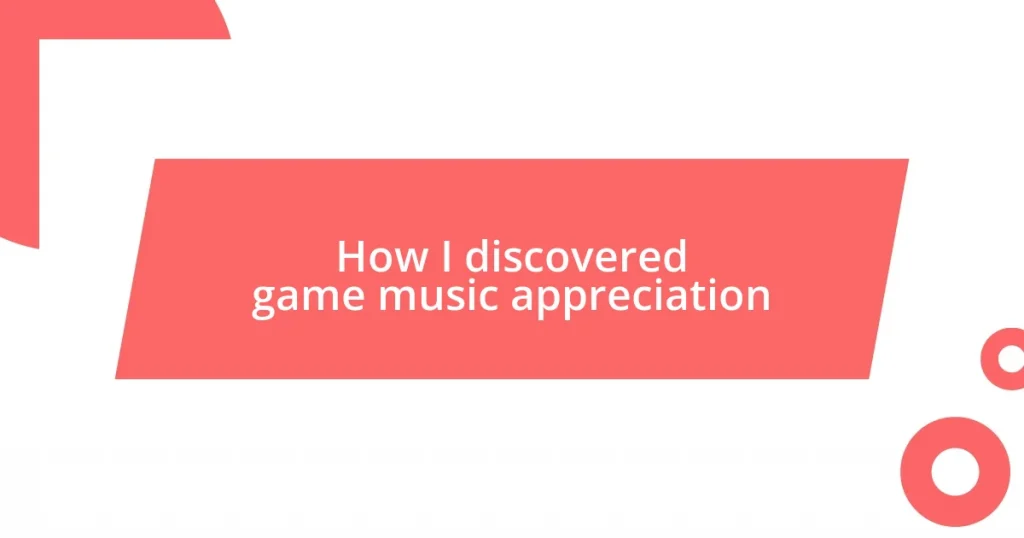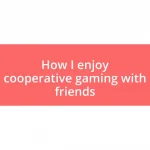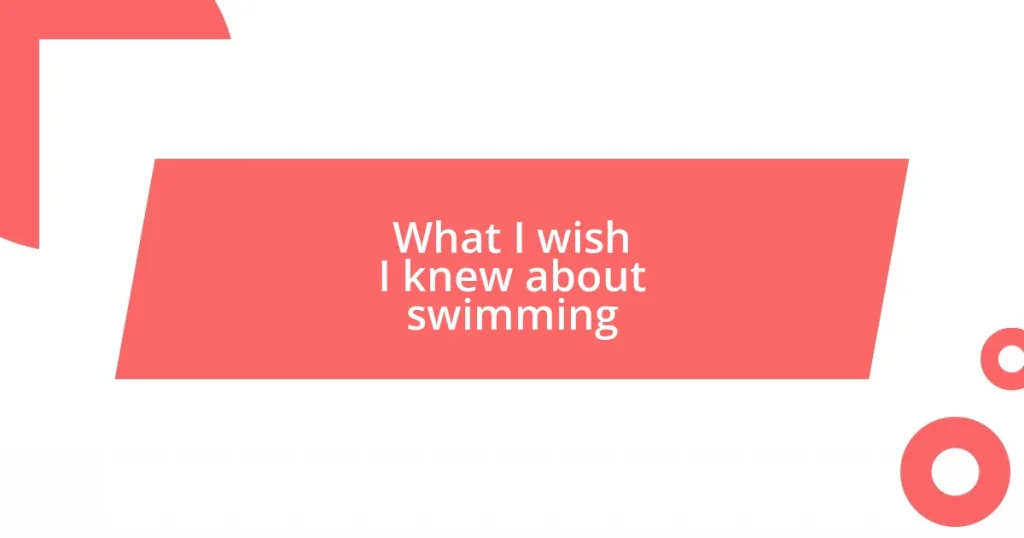Key takeaways:
- Game music enhances emotional connection and storytelling, serving as a powerful narrative tool that influences player experiences.
- Different genres of games elicit distinct emotional responses through unique soundtracks, reinforcing relationships between gameplay and music.
- Attending game music events creates a deeper appreciation for the genre, fostering community connections and personal insights into the creative process of composers.
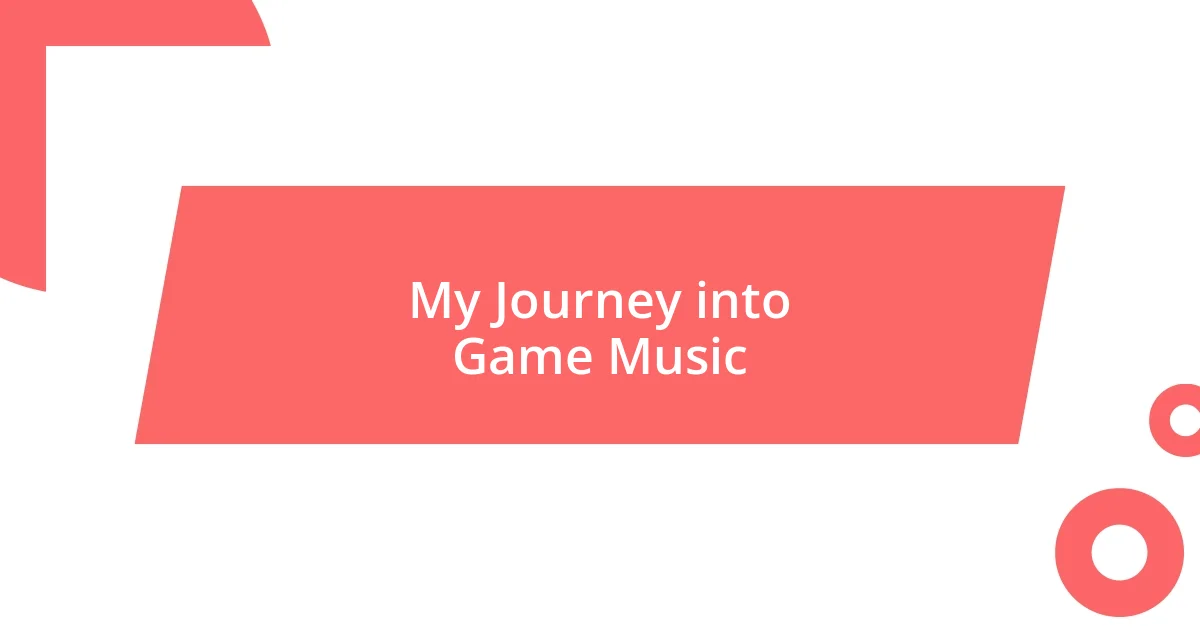
My Journey into Game Music
When I first stumbled upon the soundtrack of “Final Fantasy VII” during a late-night gaming session, I felt an unexpected wave of emotion wash over me. The music was not just background noise; it became integral to my experience, enhancing every battle and heart-wrenching moment. Have you ever noticed how a song can teleport you back to a particular time and place? That’s precisely what happened to me, igniting a passion for game music that I didn’t know existed.
As I explored more soundtracks, I found myself drawn to the sheer diversity within game compositions. From the epic orchestral scores of “The Legend of Zelda” to the jazzy tunes in “Persona 5”, each piece seemed to tell a story. I remember sitting with my headphones on, closing my eyes, and letting the music transport me to fantastical worlds; it was exhilarating. Have you ever felt transported by music? Those moments of connection are what really sparked my appreciation for the art form.
Eventually, I began sharing my favorite scores with friends, discussing the emotions behind them and how they complemented the gameplay. In one memorable conversation, a friend mentioned how a particular melody from “Journey” made them feel utterly alone yet oddly at peace. I realized then that game music isn’t just about notes and rhythms; it’s about the feelings and memories we associate with them. Doesn’t that make you reflect on your own experiences with game soundtracks? Each score holds a piece of our personal journey, transforming how we connect with the stories we love.
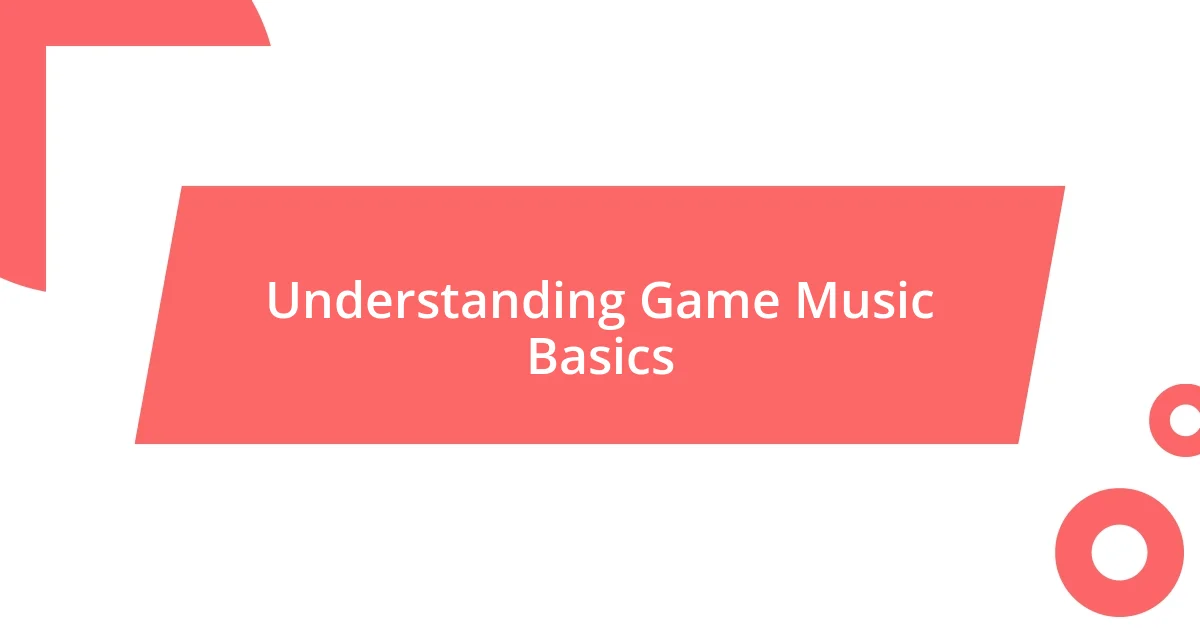
Understanding Game Music Basics
Understanding Game Music Basics
Game music serves as more than mere accompaniment; it’s a powerful narrative tool. I recall playing “The Last of Us” and how the haunting guitar melodies enhanced my sense of isolation. The music guided my emotions just as much as the characters did, making me realize how strategic placement of sound can elicit feelings of hope or despair. Can you remember a moment where music shifted your game experience?
As I delved deeper into the intricacies of game soundtracks, I learned about different genres and styles employed by composers. For example, the use of ambient synths in games like “Oxenfree” sets an eerie yet nostalgic atmosphere. In a way, I think of it as a musical language that speaks to players on a personal level, triggering memories and emotions uniquely tied to each experience. What are some soundtracks that have left an imprint on your memory?
The relationship between gameplay and music is symbiotic. In my own experience with “Celeste,” the frenetic and uplifting score fueled my determination to overcome challenging levels. It was as if the music was cheering me on, motivating me to push through obstacles. Similarly, game music often reacts to in-game events—think of the tension-building score in “Resident Evil” as you navigate a dark corridor. Do you find yourself responding to game challenges through the music’s cues?
| Concept | Description |
|---|---|
| Music as Narrative | Enhances story and emotional depth |
| Genre Diversity | Engages players through various musical styles |
| Gameplay Relationship | Creates a feedback loop between actions and emotions |
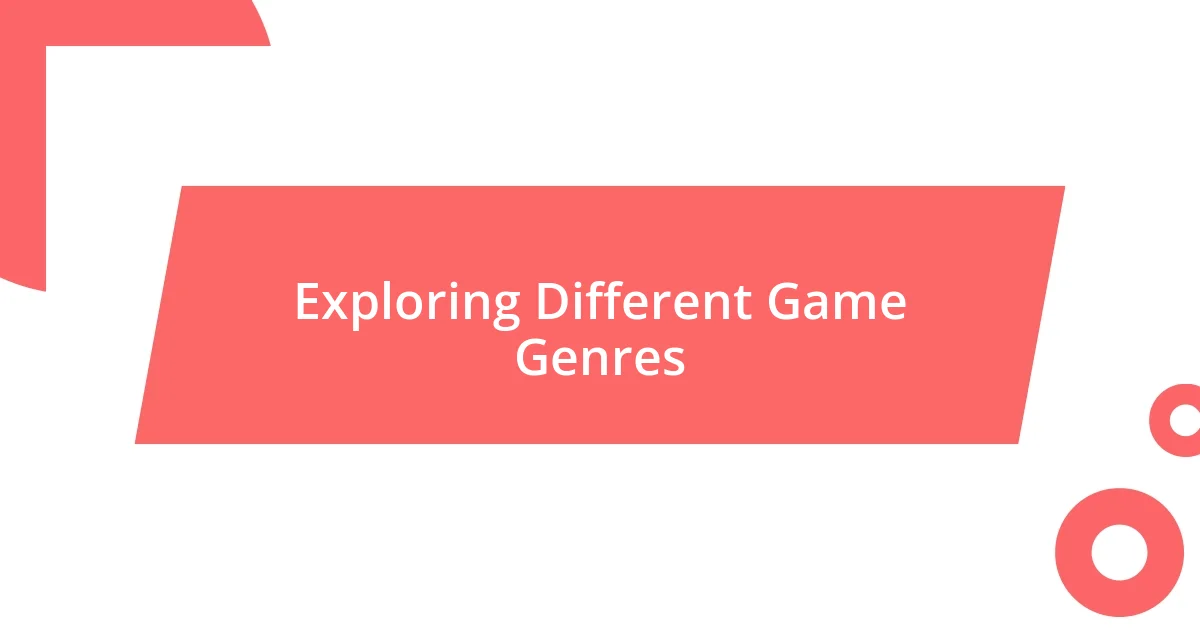
Exploring Different Game Genres
Exploring different game genres has profoundly shaped my appreciation for game music. Each genre has its own unique soundtrack that resonates in ways I never expected. For instance, when I first dove into the immersive world of role-playing games (RPGs), I was struck by the sweeping orchestral scores that accompany grand adventures. The epic melodies of games like “The Elder Scrolls V: Skyrim” made me feel as if I were embarking on an actual quest. It’s fascinating how a particular genre can elicit distinct emotional responses.
- Action/Adventure Games: High-energy scores that keep your adrenaline pumping, like those in “Uncharted”.
- Indie Games: Unique, often experimental sounds that enhance personal storytelling, as heard in “Hollow Knight”.
- Simulation Games: Chill, atmospheric tunes that create a sense of relaxation, such as in “Stardew Valley”.
- Horror Games: Dread-inducing compositions that heighten tension, beautifully exemplified by “Silent Hill”.
As I navigated through these genres, I began to recognize patterns—the sound design often reflects gameplay mechanics. For example, while playing “Dark Souls”, the haunting music underscored the weight of each encounter, making every victory feel hard-won. It struck me how certain themes might evoke dread while others promote triumph, vividly connecting the music to my journey in the game. Have you ever noticed how a soundtrack perfectly aligns with the emotions of gameplay? It’s those moments that deepen our connection to the genre itself.
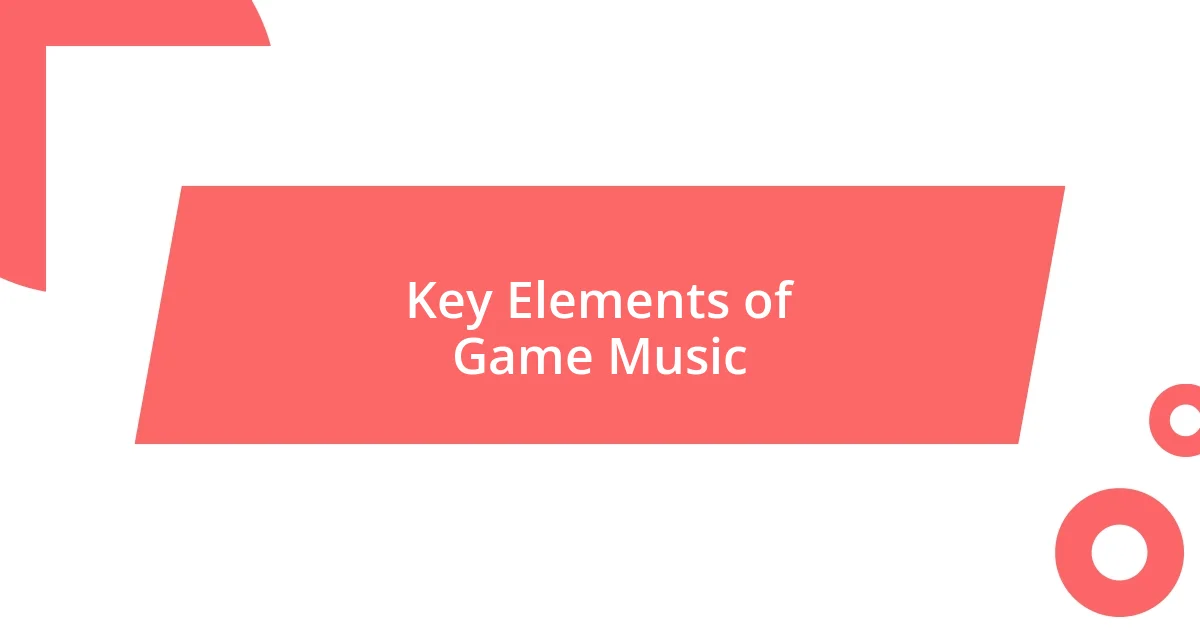
Key Elements of Game Music
When I think about the key elements of game music, one aspect that stands out is the use of leitmotifs—musical themes that represent characters or ideas. I vividly remember how the recurring piano melody in “Final Fantasy VII” evoked nostalgia and longing every time it played. The way composers weave these motifs throughout the score can create a deep emotional connection, making players feel the weight of their actions and the story’s stakes.
Another crucial element is dynamic scoring, where the music adapts to the gameplay in real-time. I experienced this firsthand while playing “Breath of the Wild.” As I approached a dangerous enemy, the tension in the score escalated, instantly heightening my anxiety. This interaction between the player and the music isn’t just clever—it draws us deeper into the narrative, transforming our gaming experience. Have you noticed moments when the music shifted to match your heart rate?
Lastly, sound design plays a fundamental role in crafting a game’s atmosphere. I recall diving into the haunting landscapes of “Hollow Knight,” where every subtle ambient noise added to the sense of isolation and exploration. The rustling leaves, distant echoes, and gentle soundscapes create an immersive world that pulls you in completely. When I reflect on it, I realize how essential these auditory details are to shaping my overall experience and engagement with the game. What’s your favorite game moment where sound alone transported you to another world?
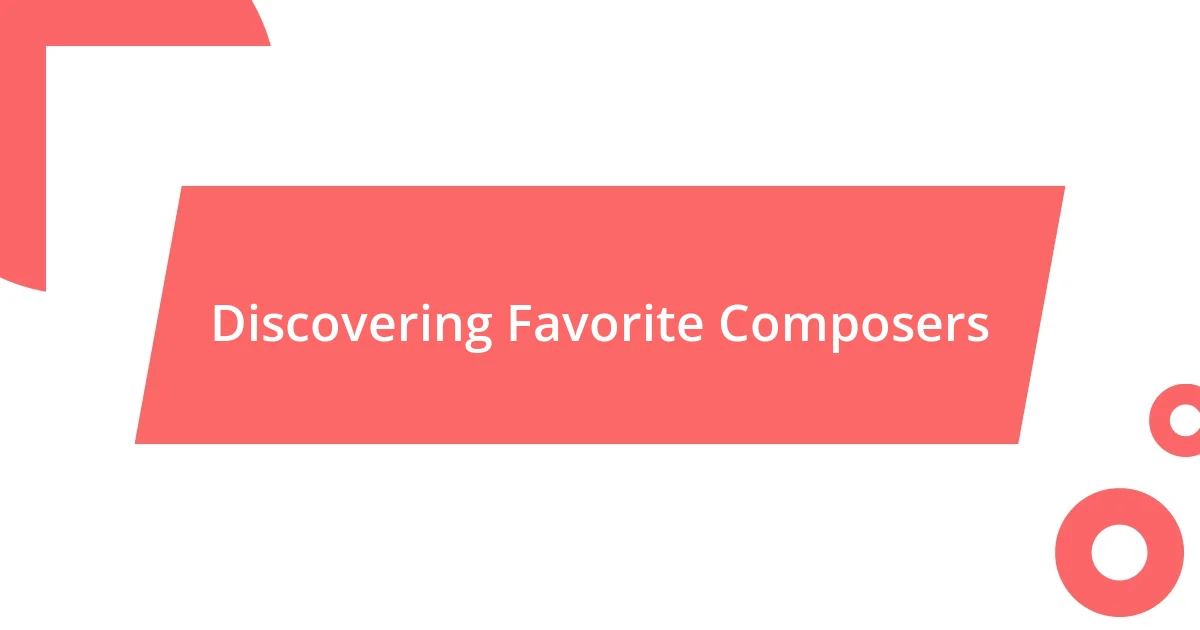
Discovering Favorite Composers
As I delved deeper into the world of game music, my ears perked up at the distinctive styles of various composers. For instance, discovering Nobuo Uematsu’s work in the “Final Fantasy” series felt like finding a hidden gem. His melodies resonate with such emotional weight that they often linger in my mind long after I’ve put down the controller. Can you recall a piece of music that still gives you chills, even outside the game?
I also became enchanted by the unique soundscapes created by Austin Wintory in “Journey.” His composition evokes a sense of exploration and solitude, perfectly mirroring the gameplay experience. What struck me the most was how the music could transport me to a serene desert landscape, creating an atmosphere of introspection. It’s as if every note was designed to stir an inner journey that paralleled the character’s own.
Another composer who has left a lasting impression on me is Yasunori Mitsuda, especially with the score for “Chrono Trigger.” I remember feeling a rush of nostalgia as I listened to “To Far Away Times.” It’s amazing how different compositions can convey feelings of hope, adventure, or longing. Have you ever found a composer whose style seemed to speak directly to your soul? The diversity in game music truly reveals a depth of artistry that continues to inspire my appreciation for the genre.
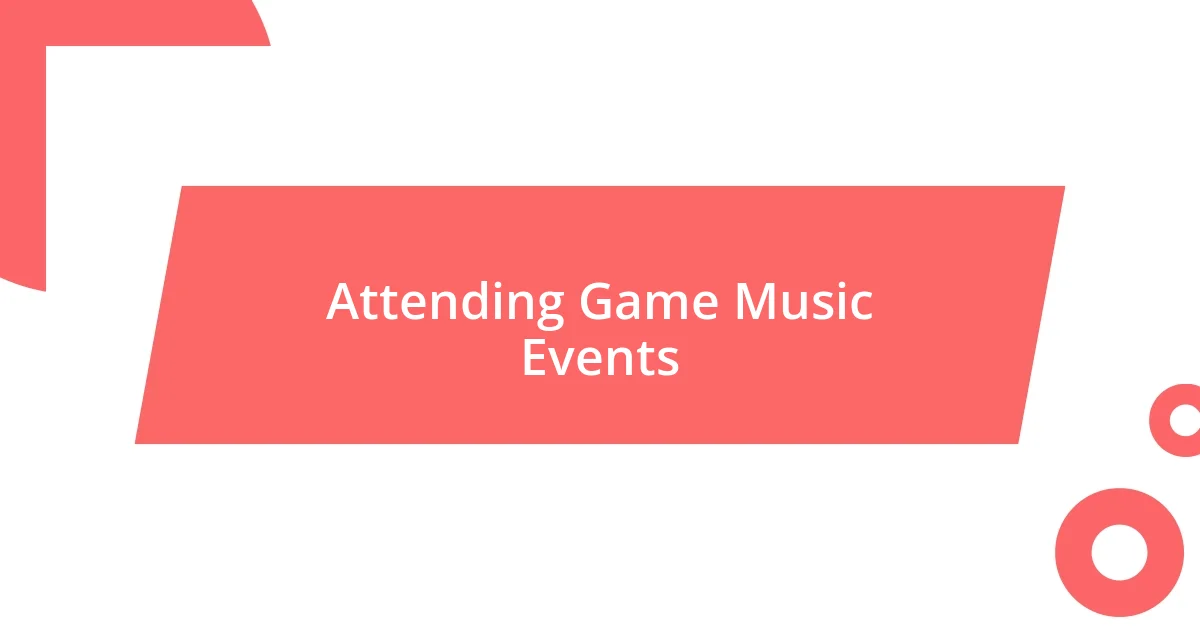
Attending Game Music Events
There’s something magical about attending game music events that truly enhances my appreciation for the genre. I remember my first experience at a game concert where the orchestral arrangements of familiar scores filled the air. Hearing the music come alive in a live setting sent chills down my spine; it felt like a reunion with old friends. Have you ever stood in a crowd, surrounded by fellow enthusiasts, and felt that unspoken bond?
At a particular event, I was captivated by the passion shown by the composers as they introduced their pieces. One story that stood out was when a composer shared how a specific melody was inspired by a personal hardship. Hearing that made the music take on a new life for me. It was a reminder of how deeply personal experiences can influence creativity—do you have a piece of music that resonates with a significant moment in your life?
I also appreciate the diverse community that emerges at these events. While chatting with fellow attendees, I found that everyone had their own favorite soundtracks and emotional attachments to them. The discussions often veer from shared nostalgia to debates over which game soundtracks have the most impact. It’s interesting to think about how we all connect with music differently—what’s a game score that leaves you feeling invigorated? Engaging with others in this way has deepened my understanding and enjoyment of game music as an art form.










